‘It’s great we are not alone,’ says Volodymyr Zelenskyy as EU leaders hold defence summit – Europe live
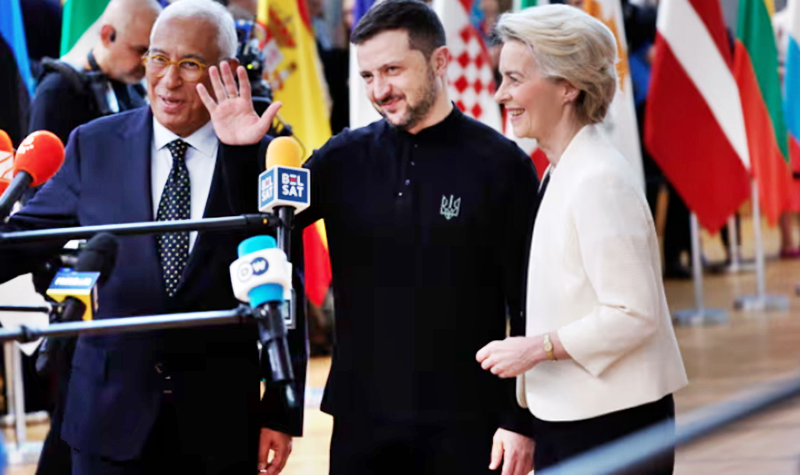
By Guardian - Jakub Krupa - Thu 6 Mar 2025 13.39 GMT
Ukrainian president thanks European leaders as they gather to discuss €800 bn.plan to boost military capacity.
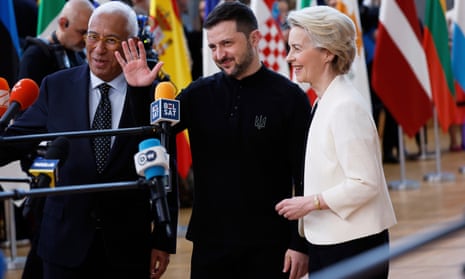
From 3h ago11.15 GMT
'It's great we are not alone,' Zelenskyy says as he arrives at EU summit
On his arrival, Zelenskyy thanks European leaders for their “strong support” which he says he has seen “from the very beginning of the war and … during all this period and last week, you stay[ed] with us.”
We are very thankful that we are not alone.
And these are not just words. We feel it.
It’s very important you [sent] a strong signal to Ukrainian people, to Ukrainian warriors, to civilians, to all our families.
And it’s great that we are not alone.


ShareUpdated at 11.19 GMT11m ago13.39 GMT
Zelenskyy meets Macron on sidelines of EU summit
Belgian prime minister Bart De Wever is not the only EU leader who separately met with Ukrainian president Volodymyr Zelenskyy on the sidelines of the EU summit.
Turns out French president Emmanuel Macron also sat down with the Ukrainian leader to go through the latest ideas and plans for Ukraine as they continue working on a proposal that could satisfy the US administration under Donald Trump and help achieve a just and lasting peace that European leaders call for.
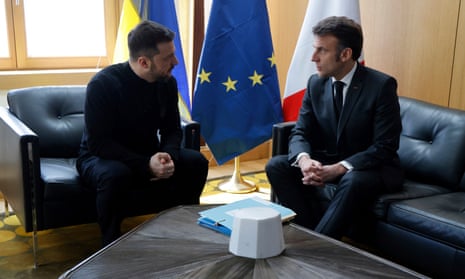
Share17m ago13.32 GMT
Merz's plans for German emergency defence, infrastructure spending face hurdles - snap analysis
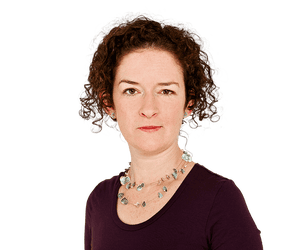
Kate Connolly
Berlin correspondent
Even as there appears to be growing domestic consensus over the plans of Germany’s chancellor-in-waiting Friedrich Merz to massively boost spending on defence and infrastructure with a multi-billion Euro fund and relaxing Germany’s notorious debt brake, he faces considerable hurdles.
‘A risky bet’: Friedrich Merz criticised over plan to lift Germany’s debt rules.
Merz will seek to push the legislation through the existing parliament this month, where his conservative alliance and the SPD, prospective coalition partners in the new government, still have the necessary two-thirds majority required, along with the Greens.
This is because under the new parliamentary constellation, a third of the seats will belong to the left and right-wing fringes, Die Linke and the AfD, whose support is either nigh-on impossible or far from guaranteed.
The far-right AfD have said they are looking into the legality of what Merz is attempting.
The far-left Die Linke has not excluded voting for the plans. Its co-leader, Jan van Aken said this morning it would consider doing so “under certain conditions”.
On the one hand the party is in favour of more money for Germany’s ailing infrastructure by relaxing the rules of Germany’s debt brake, but it is against the “incredibly high level of military build up” being proposed, he said.
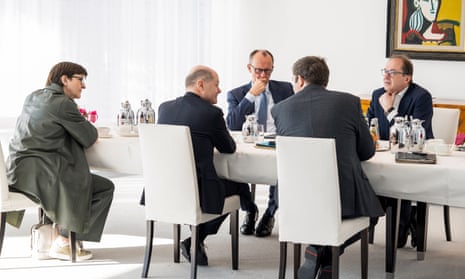
The huge challenge Merz has set himself in trying to shoehorn the legislation into this tight time frame includes still having to win over the Greens to the plan. The party is due to go into opposition and some members are smarting at the brazen way in which they have been dealt with by the conservatives, who have often been disdainful towards them including ridiculing and blaming them for Germany’s current economic woes.
Britta Haßelmann, the party’s parliamentary leader has said it is far from certain whether Merz can rely on the Greens’ support for his multi-billion euro financial package, referring today to the “very complicated intervention in the Basic Law” that he is planning.
“How we vote is completely open, because there are still many questions in the room,” she said.
Noticeably missing so far from the cut and thrust of the debate, or it seems, even wanting to be seen to actively rally their party colleagues, are the Greens’ leading figureheads, and stalwart supporters of Ukraine, Annalena Baerbock and Robert Habeck, the current foreign and economics ministers respectively, both of whom have announced they are to step down from frontline politics.
As an indication as to how tight Merz’s timeline is: Germany’s new parliament is set to convene on 25 March.
The two special sessions of the existing Bundestag at which he hopes to get the required support for his deal are to take place on 13 and 18 March.
Share30m ago13.13 GMT
All smiles at UK-Ireland summit; Martin now off to Brussels

Lisa O'Carroll
UK prime minister Keir Starmer has described the first annual British-Irish summit as “a really successful” meeting “where a huge amount of progress was made”.
His Irish counterpart Micheál Martin is now on his way to Brussels to join the EU emergency council meeting.

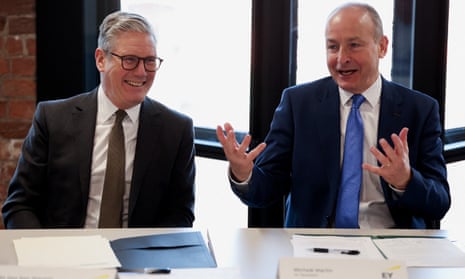
Share1h ago12.48 GMT
Hungary's Orbán says European nations, not EU, need to strengthen defence
Let’s hear more from Hungarian prime minister Viktor Orbán as his team just posted an update on his meetings in Paris, where he was before today’s summit and where he spoke with three political heavy-hitters: Emmanuel Macron, far-right leader Marine Le Pen, and former president Nicolas Sarkozy.
Nicolas Sarkozy fitted with electronic tag after losing corruption appeal
In a social media post, Orbán said:
My meetings in France confirmed that while we may disagree on the modalities of peace, we do agree that we must strengthen the defence capabilities of European nations, & these efforts should empower member states rather than Brussels bureaucrats.
He hailed “exceptionally close” cooperation with France, and said he expected French companies to be a “significant investor” in Hungary.
But, in a pointed endorsement, he also posted a picture with Le Pen, saying:
After meeting with both the former and current Presidents of France, it was a pleasure to meet with the future President. Thank you for the insightful discussion @MLP_officiel!

ShareUpdated at 12.51 GMT1h ago12.40 GMT
Ukrainian protest at US Embassy in Kyiv - in pictures
Protesters rallied outside the US embassy in Kyiv on Thursday to bring attention to the fate of Ukrainian prisoners of war and ensure their inclusion in any deal to stop the conflict with Russia.
The US had been Ukraine’s biggest backer until president Donald Trump initiated a complete shift in his country’s foreign policy and halted US support to Ukraine, Reuters noted.
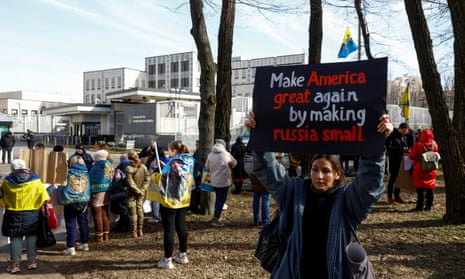
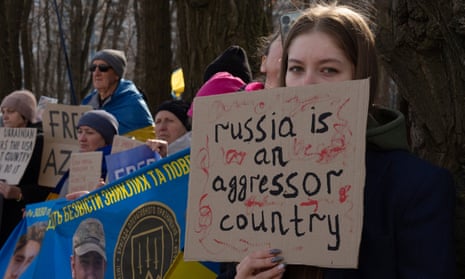
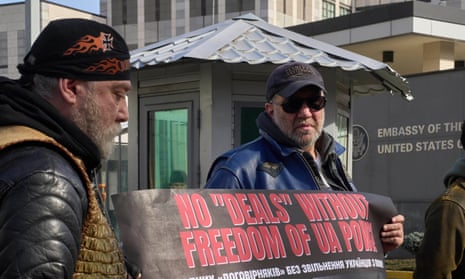
Share1h ago12.35 GMT
Portugal faces government crisis with confidence vote next week
Sam Jones
Madrid correspondent
Portugal is bracing for its third snap general election in four years after the country’s cabinet approved a motion of confidence called by the centre-right prime minister, Luis Montenegro, who is facing growing questions over his family’s business dealings.
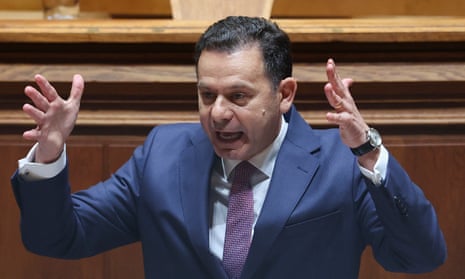
Montenegro, who took office last year and heads a minority government, is likely to lose the vote – which is expected to be held next Tuesday, according to the state broadcaster, RTP – as the opposition socialist and the far-right Chega party have said they will not lend him their support.
That would trigger the collapse of Montenegro’s government and is likely to lead the president, Marcelo Rebelos de Sousa, to dissolve parliament and call a fresh election in May.
The current crisis has been prompted by allegations that a consultancy firm owned by the prime minister’s family has benefited from contracts with several private companies that rely on government concessions.
Montenegro, who has denied any conflict of interest, saw off a censure vote on Wednesday, but said the country needed “political clarification”.
“Having an early election would be a necessary evil ... to end the atmosphere of permanent insinuations and intrigues,” he told MPs.
Montenegro’s party has said he would lead it in any new election.
The main opposition Socialists and far-right party Chega, which together have 128 seats in the 230-seat house, said they would reject a motion of confidence.
Since the restoration of democracy in 1974, only one out of 11 such motions has been rejected by parliament, in 1977.
(with Reuters and AFP)
Share1h ago12.29 GMT
UK PM hails 'new era' in relations with Ireland, 'turning page' on turbulent Brexit years

Lisa O'Carroll
UK prime minister Keir Starmer has said a “new era” is opening in Anglo-Irish relations after years of toxicity caused by Brexit as he opened a summit between the British and Irish governments in Liverpool.
He said the need for a strong relationship between the UK and Ireland “has never been greater” and in the current turbulent times there were “huge benefits” to friendship between the two countries.
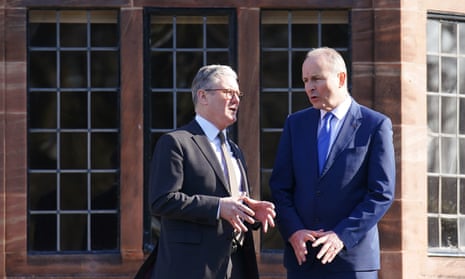
The prime minister said he wanted to focus on three themes during the meeting: the UK and Ireland working together to achieve economic growth, domestic security, and the transition to net zero.
Today’s summit really marks a new era in the relationship between the UK and Ireland. I think we’ve reset our relationship, turned a page on the turbulent years if I may say in recent years.
As we sit here today, I think we would all agree that the world is more uncertain and unstable than it has been for a very long time and there are huge benefits to strengthening our friendship and working together on geopolitical challenges.
In turn the taoiseach Micheál Martin praised Starmer for taking on a new leadership role in Europe as the transatlantic relationship with the US ruptures under Donald Trump who in the last two days has paused military support and intelligence to Ukraine.
“You have borne the centre of gravity and stability to that situation which I think is appreciated, and I want you to know that,” Martin said addressing Starmer at the beginning of the summit.
ShareUpdated at 12.32 GMT1h ago12.21 GMT

Jakub Krupa
As the leaders are now talking behind the closed doors, let’s quickly catch up on events elsewhere.
Share1h ago12.18 GMT
Belgium continues to support Ukraine, prime minister assures Zelenskyy
Before coming to the EU summit, Zelenskyy was welcomed in Brussels by the Belgian prime minister Bart De Wever, who reassured him in a bilateral meeting that Ukraine “can count on our continued support.”
He added that Belgium would not accept any decisions about Ukraine’s future made without Ukrainian leaders.
“Russia is the aggressor, Ukraine is the victim. We must never lose sight of that,” he said.
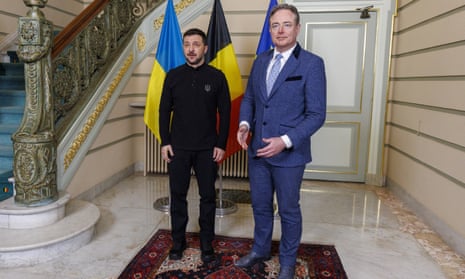
Share2h ago12.08 GMT
Ukrainian opposition leaders reject US suggestions of wartime election
Ukrainian opposition leaders have dismissed the idea of holding a wartime election, after a media report of contacts between them and US officials and in the wake of President Donald Trump calling his Ukrainian counterpart Volodymyr Zelenskyy a “dictator” for not holding one, Reuters reports.
Former Ukrainian president Petro Poroshenko said on Thursday his team was working with US “partners” to maintain support for Ukraine – but he added that he was opposed to a wartime election.
In a written statement published on Telegram, Poroshenko said elections should only happen after peace had been established. He added that a vote should take place no later than 180 days after the end of the war.
Yuliia Tymoshenko, another opposition leader, said her team “is talking with all our allies who can help in securing a just peace as soon as possible,” and said that elections should not take place before this had been achieved.
Politico reported on Wednesday that four senior members of Trump’s entourage had held discussions with some of Zelenskiy’s top political opponents.
The talks were held with Tymoshenko and senior members of the party of Poroshenko, who was president from 2014 to 2019, Politico reported, citing three Ukrainian lawmakers and a U.S. Republican foreign policy expert.
The discussions focused on whether Ukraine could have quick presidential elections, according to the report.
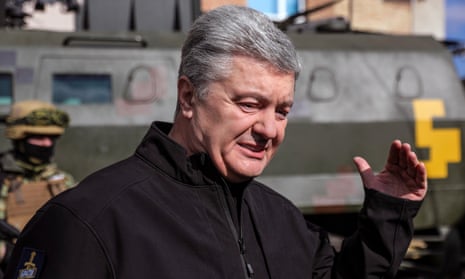
Share2h ago12.03 GMT
What is behind Hungary and Slovakia's opposition for further Ukraine help
Since concerns about Hungary and Slovakia keep coming up, let’s spend a second looking at why the two countries oppose further support for Ukraine.
Hungarian prime minister Viktor Orbán said earlier this week that “continuing the war in Ukraine is bad, dangerous, and a mistake,” insisting that Ukraine should instead agree to take part in US-led peace talks with Russia at the earliest opportunity.
Last week he wrote to European Council president António Costa that there were “strategic differences in our approach to Ukraine that cannot be bridged”.
In turn, Robert Fico – who faces major protests in the country over his increasingly pro-Russian position in foreign policy – told reporters that he would oppose increase in defence spending, and said he wanted a mention of reopening Russian gas transit through Ukraine – a major route of energy for Slovakia which Kyiv stopped this year – as part of summit conclusions, according to reports by SITA and Sme.
Repeating unfounded allegations of widespread corruption in Ukraine, he said he was not prepared to support sending more money to Kyiv “as half of it would get stolen.”
“Of course that Zelenskyy is interested in keeping the war going, because he does not have a mandate, and knows well that he would not be re-elected as president,” he said.
He insisted that Ukraine should agree to an immediate ceasefire and not demand it to be a part of a broader peace arrangement.
Fico also said that Slovak representatives would not take part in next week’s Paris meeting, organised by president Macron, as he does not want Slovakia to be a part of any talks on expanding the French nuclear deterrent.
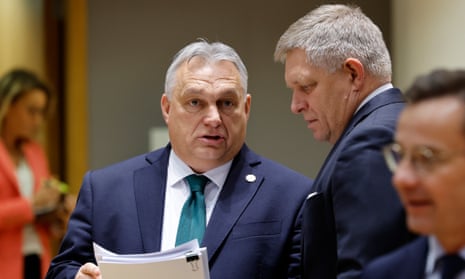
Share2h ago11.43 GMT
No dictated peace for Ukraine, Germany's Scholz says, as he welcomes German defence spending plans
German outgoing chancellor Olaf Scholz says today’s meeting is about ensuring continued support for Ukraine, but also pointedly stresses the importance of maintaining good relations with the US.
Scholz also acknowledges plans put forward by the presumed future chancellor Friedrich Merz to boost its defence spending, “including by changing the constitution,” and he says there appears to be a growing domestic consensus on this issue.
He says the EU needs to change its rules along similar lines to ensure it can meet the challenge, but keeping an eye on “long-term solutions.”
Asked about Macron’s proposals on nuclear deterrence, he says that Europe should not give up on the US involvement. His long-standing criticism on this point relates to fears that any extension of the French programme would allow the US to disengage with European security further.
Scholz also once again rejects the idea of common European defence bonds.
Asked about any peace talks, he says “it is very important that we ensure that Ukraine does not have to accept a dictated peace, but that we have a fair, just peace that guarantees Ukraine’s sovereignty and independence.”
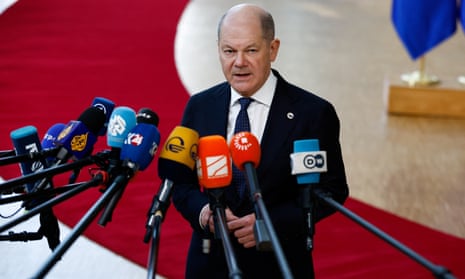
Share2h ago11.32 GMT
Day when everything changes for Europe's determination to face Russian challenge, Poland's Tusk says
Polish prime minister Donald Tusk says “it is a day when everything can change and probably will change, when it comes to Europe’s determination when it comes to rearming [Europe] and the defence industry and our readiness to face this Russian challenge to the world.”
“Europe as a whole is truly capable of winning any military, financial, economic confrontation with Russia - we are simply stronger,” he says.
He compares the situation to the cold war, saying he is confident “Russia will lose this arm race, just like the Soviet Union did 40 years ago.”
He says the French proposal on nuclear deterrence is “worth considering,” and should form a part of a wider move to coordinate European defence efforts.

Share2h ago11.21 GMT
We need to move to strengthen defence even if one, two countries disagree, Luxembourg's PM says
Luxembourg’s prime minister Luc Frieden told reporters that more European defence was needed and today’s Council should take decisions even if some countries disagree with what is being proposed.
“We need more European defence and if one or two countries do not want to share that view, I think that the others should go ahead as much as they can. And that is what I am advocating for,” he said.
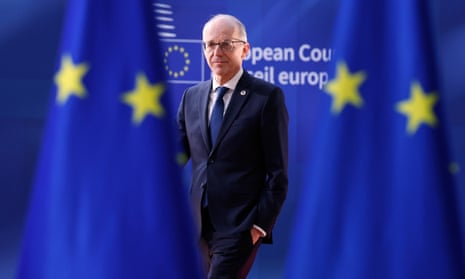
Share2h ago11.19 GMT

'About damn time,' European Parliament president Metsola says
European Parliament president Roberta Metsola said it was “about damn time” for European leaders to “say that we are ready to put finally our money where our mouth is on Ukraine.”
This is something that we have been asking for a long time: that the European Union, that Europe is capable of standing up on its own two feet.
That’s why we’ve been saying we need to scale up. We need to be prepared. We need to produce and we need to protect.
That is essentially what our citizens are asking from us.
The Guardian’s expert news coverage is funded by people like you, not a billionaire owner. Will you help us keep our independent journalism free and open to all today?
Back to top© 2025 Guardian News & Media Limited or its affiliated companies. All rights reserved. (dcr)
